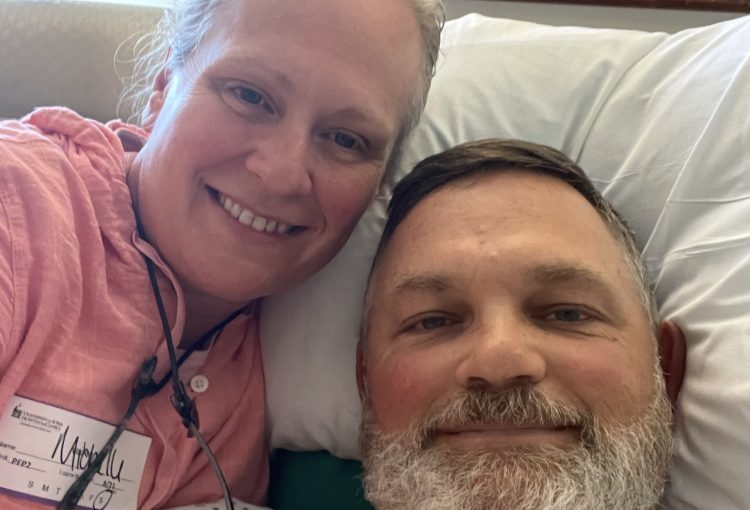PERSISTENCE PAID FOR 8-YEAR PNET SURVIVOR JIM POLICH
Written By Julia Brabant
February 2024
Diagnosed: December 15, 2015
Status: Consistently Clean Scans
When Jim Polich found out he had a pancreatic neuroendocrine tumor, his thoughts immediately turned to his wife and seven children. As the gravity of his diagnosis set in, Jim’s main concern wasn’t for himself, but for the well-being and future of his family. Determined to fight for his loved ones, Jim sought multiple medical opinions and explored all possible treatment options, including participation in clinical trials. Now, eight years later, he’s sharing his story with the hope of helping others recognize the power of family, faith and modern medicine.
Diagnosed with a high-grade, poorly differentiated pancreatic neuroendocrine tumor (PNET) Dec. 15, 2015, Jim, of Waco, Texas, first thought that the abdominal pain he felt was the result of a fall he took while skating. As the pain worsened and began radiating heat throughout his body, Jim also began dry-heaving and developing gallbladder issues.
His doctor conducted a series of tests, and a CT scan administered on Jim’s birthday revealed both a blood clot in his spleen and a six-inch tumor wrapped around the body and tail of his pancreas. Targeting the tumor required Jim to take Cisplatin, a platinum-based chemotherapy drug, along with other medication. He had eight cycles of chemotherapy that wound up shrinking his tumor by about 45%.
Future chemo treatments (CAPTEM) proved less effective, leading to little progress but lots of neuropathy, or numbness and tingling that often affects the hands and feet. Jim’s care team wanted him to try FOLFIRINOX, another type of chemotherapy drug, but he had reservations about side effects and decided to look elsewhere instead.
Jim’s condition continued to worsen despite the change, so he started researching alternative options online. He stumbled across a YouTube video by an Australian doctor detailing how those with PNETs can benefit from Peptide Receptor Radionuclide Therapy, or PRRT. A highly targeted type of radiopharmaceutical therapy, PRRT requires people to have intravenous injections and has minimal side effects.
Intrigued, Jim drove three hours to Excel Diagnostics in Houston who provided this type of therapy and underwent a Gallium 68 scan, also known as a Ga-68 dotatate scan. This type of scan can identify neuroendocrine tumors within the body and helps determine if a patient might be a good candidate for PRRT. Jim’s doctor said his scans “lit up like a Christmas tree,” indicating he was a great candidate for the therapy.
Jim moved forward with PRRT, and after four cycles, his tumor shrank another 55% in size. He developed some problems urinating, though, and continued to explore other options.
Jim had heard about a new clinical trial involving OPDIVO and YERVOY and wondered if he might be able to join it. The trial directors told Jim that while he wasn’t currently eligible to participate in the trial, that could change if his disease progressed. When Jim’s scans showed that his tumor had grown by about 15%, he got back in touch with the team leading the trial, and they added him to it.
Jim began the clinical trial in November 2017. He responded extremely well, but the surgeon he’d hoped would eventually operate on him still had concerns about moving forward.
“I said, look; I have a wife and seven kids,” Jim recalls telling the surgeon. “My object isn’t to live for myself, but to be here as a father and husband. If surgery will do that, let’s do it.”
Because of his original doctor’s hesitancy to perform surgery, Jim decided to explore other options. He traveled to Denver, Colorado, to meet with Dr. Eric Liu, M.D., at Rocky Mountain Cancer Center.
“It was a whole new experience.” Jim said, of the meeting. “You don’t just sit in a room with him – you go into his office and meet the whole team.
Dr. Liu also had a different perspective of Jim’s case, changing his “poorly differentiated” status to “well-differentiated” and his original diagnosis to “neuroendocrine carcinoma.” Dr. Liu believed Jim’s case was an “oddball,” case and that is why he responded so well to immunotherapy. He then met Dr. James Howe at the University of Iowa Hospitals and Clinics, another well-known surgeon for Neuroendocrine tumors and decided on Dr. Howe.
Jim underwent surgery, with the 14-hour procedure involving the removal of lymph nodes as well as his spleen, pancreas tumor, gallbladder and an adrenal gland. After surgery, Jim continued the clinical trial until November 2020, but tests given in February 2021 showed a recurrence in his lymph nodes and pelvic area. As a result, he had a second surgery in August 2021.
Now, two-and-a-half years post-surgery, Jim continues to have clean scans. He’s back on OPDIVO, which requires him to have 30-minute injections once a month. These regular immunotherapy treatments help his body recognize and fight off cancer cells. Jim, like many others, also became diabetic after surgery and has to monitor and regulate his blood sugar as a result.
Jim also opted to undergo genetic testing amid treatment to see if he had any predispositions to cancer his children should know about. The tests didn’t reveal anything of concern, so Jim and his team concluded his condition didn’t appear to be the result of genetics.
While Jim may not know what caused him to develop a PNET, he does know who to thank for helping him survive his.
“The biggest thing I’ve learned over the last eight years is that all doctors are not the same,” he said. “Do your research – find clinical trials, and find the right doctors. That’s the biggest reason I’m alive today and in the shape I’m in – because I was initially told, ‘We don’t have anything else we can do for you.’”
Jim also said that, in his case, spirituality played a part in helping him come to terms with his cancer. About three months before his diagnosis, Jim experienced a “spiritual breakthrough” of sorts, prompting him to reevaluate his lifestyle and put more focus on his personal relationships.
“When I was diagnosed three months later, having gone through what I’d just gone through helped propel me through it,” Jim said. “It was hard, but with the faith I had, I knew I’d overcome it.”
Jim also urges other people with PNETs or other types of cancers to learn everything they possibly can about their particular disease.
“When you know and understand your disease, it gives you the power to go into those meetings with the doctors and ask the questions that need to be asked,” he said. “If you don’t feel right, get a second opinion. I got five opinions in eight years. I liked all the doctors, but each had their own opinion. You have to know what way you want to go.”
Jim welcomes communications from others dealing with pancreatic neuroendocrine tumors and encourages anyone with questions about his own experiences or treatments to email him at jcpoljr@gmail.com.




